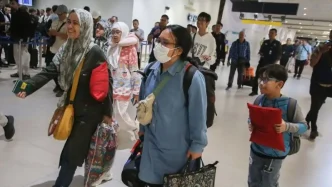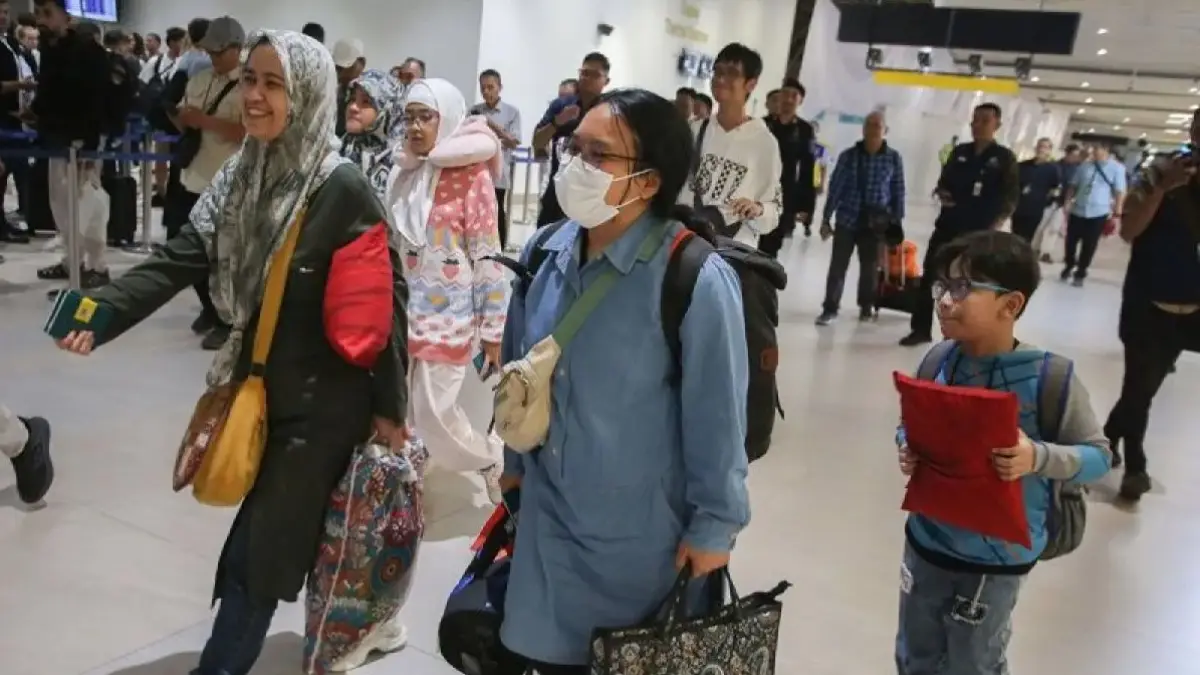In a significant operation prompted by escalating violence in the Middle East, Indonesian authorities have successfully evacuated dozens of citizens from conflict zones in Iran, Yemen, and Israel. On June 24, 2025, 49 evacuees, including 48 Indonesians and one foreign national married to an Indonesian, arrived at Soekarno-Hatta International Airport in Tangerang, Banten, after a harrowing journey from Iran via Azerbaijan. This group marks just one wave of a broader effort to repatriate hundreds of Indonesians caught in the crossfire of the intensifying Iran-Israel conflict, with more expected to return in the coming days.
Evacuation Amid Escalating Conflict
The latest group of evacuees endured a grueling 16-hour land journey from Iran to Azerbaijan, fleeing the violence that has gripped the region since mid-June. From Baku, they traveled on three separate commercial flights, transiting through Istanbul, Turkey, and Doha, Qatar, before finally reaching Jakarta. Judha Nugraha, the Foreign Ministry’s director of citizen protection, confirmed the safe arrival of the group on June 24, noting the complexity of coordinating such an operation under volatile conditions. “The 49 evacuees flew in three separate commercial flights from Baku” said Nugraha in a statement on June 25.
Beyond the group from Iran, the Indonesian government also facilitated the return of three nationals from northern Yemen, a region controlled by the Houthi armed group, with assistance from the Indonesian Embassy in Muscat. Simultaneously, the embassy in Amman supported the repatriation of two Indonesians residing in Tel Aviv and Jerusalem, areas directly affected by the ongoing hostilities. All evacuees from Yemen and Israel arrived in Jakarta on the same day as the larger group from Iran.
This operation follows an earlier evacuation on June 23, when 11 Indonesians from Iran landed in Jakarta after rerouting through Turkey due to a sudden closure of Qatari airspace. The closure was reportedly triggered by an Iranian missile attack on a Qatari base housing US forces, underscoring the unpredictable and dangerous nature of the conflict zone. In total, 97 individuals, including 93 Indonesian citizens, three embassy staffers, and an Iranian national married to an Indonesian, have been evacuated from Iran since Jakarta elevated its alert status for the Tehran embassy to the highest level on June 21.
Heightened Alerts and Broader Implications
The decision to raise alert levels came in response to a sharp escalation in tensions between Iran and Israel, marked by a series of missile attacks exchanged between the two nations. The conflict intensified on June 13, when Israel launched strikes on Iranian targets, prompting retaliatory airstrikes from Iran on Israeli territory. The situation worsened further when the United States conducted an airstrike on an Iranian nuclear facility, drawing global attention to the potential for a wider regional war.
Amid these developments, US President Donald Trump announced a ceasefire agreement between Iran and Israel, claiming on June 24 that the deal was progressing “very well” despite mutual accusations of violations from both sides. If confirmed, this ceasefire could provide a temporary reprieve for civilians and foreign nationals in the region, though the sustainability of such an agreement remains uncertain given the deep-rooted animosities and complex geopolitical stakes at play.
Indonesia’s Foreign Ministry has also placed its embassies in Oman and Jordan on the highest alert status for Yemen, Israel, and Palestine, reflecting the government’s concern for the safety of its citizens across the broader Middle East. According to ministry records, at least 376 Indonesians were residing in Iran at the onset of the conflict, with many being students based in Qom, approximately 140 kilometers south of Tehran. Additionally, 194 Indonesians were in Israel when hostilities broke out, highlighting the significant number of citizens potentially at risk.
Challenges of Evacuation in a Volatile Region
Coordinating evacuations in a conflict zone presents immense logistical and diplomatic challenges. The rerouting of flights due to airspace closures, as seen with the group initially planned to transit through Qatar, illustrates the unpredictability of such operations. The Indonesian government’s ability to secure safe passage through neighboring countries like Azerbaijan and Turkey demonstrates a combination of quick thinking and international cooperation, though each journey carries inherent risks for evacuees and officials alike.
Financial costs also add to the complexity of these missions. While specific figures for the evacuation operations have not been disclosed, local reports suggest that expenses for transport, temporary accommodations, and emergency assistance can run into millions of Indonesian Rupiah per individual. For instance, a single commercial flight ticket from Baku to Jakarta, with multiple transits, can cost upwards of 15 million Rupiah (US$940), placing a significant burden on government resources during a crisis of this scale.
Moreover, the emotional toll on evacuees cannot be understated. Many of those returning to Indonesia are students or workers who have built lives in the Middle East, only to be uprooted by sudden violence. The uncertainty of when—or if—they can return to their studies or jobs adds a layer of personal hardship to the broader geopolitical crisis.
Indonesia’s Diplomatic Balancing Act
Indonesia’s response to the Middle East conflict reflects a delicate balancing act. As a nation with a long-standing commitment to non-alignment and peaceful resolution of international disputes, Jakarta has refrained from taking sides in the Iran-Israel conflict. Instead, its focus has been on ensuring the safety of its citizens, a priority that transcends political considerations. This approach aligns with Indonesia’s historical role as a mediator in regional conflicts and a vocal advocate for global peace, particularly in matters affecting Muslim-majority populations.
At the same time, the government must navigate its relationships with major powers involved in the conflict, including the United States, Iran, and Israel. While Indonesia does not maintain formal diplomatic ties with Israel, it has citizens residing there, necessitating pragmatic coordination through third-party channels. Similarly, Jakarta’s engagement with Iran, where a significant number of Indonesian students pursue religious studies, requires careful diplomacy to ensure continued cooperation during evacuations.
The involvement of the United States in the conflict, particularly through its airstrike on an Iranian nuclear facility, adds another layer of complexity. Indonesia has historically advocated for de-escalation in US-Iran tensions, and the current crisis may prompt Jakarta to renew calls for dialogue and restraint among all parties involved. Whether such appeals will resonate in a region marked by entrenched rivalries remains an open question.
Public Sentiment and Domestic Reactions
Back in Indonesia, the evacuations have drawn significant public attention, with many citizens expressing relief and gratitude for the government’s efforts. Social media platforms have been abuzz with messages of support for the evacuees, alongside calls for Jakarta to maintain a strong stance on protecting its nationals abroad. Some users have also voiced concern about the broader implications of the Middle East conflict, particularly its potential to disrupt global energy supplies and affect Indonesia’s economy, which relies heavily on imported oil.
Local leaders and community organizations have stepped in to offer support for returning evacuees, providing counseling services and temporary assistance for those displaced by the crisis. In Jakarta, several non-governmental organizations have collaborated with the Foreign Ministry to ensure that returning citizens receive the help they need to reintegrate, particularly students whose education has been interrupted.
Looking Ahead in Uncertain Times
As the situation in the Middle East remains fluid, Indonesian authorities are bracing for the possibility of further evacuations. With hundreds of citizens still in conflict-affected areas, the government faces the daunting task of ensuring their safety while managing domestic priorities. The tentative ceasefire between Iran and Israel offers a glimmer of hope, but persistent reports of violations from both sides suggest that stability is far from guaranteed.
For now, the safe return of dozens of Indonesians stands as a testament to the resilience of both the evacuees and the officials tasked with their protection. Yet, as the geopolitical chessboard of the Middle East continues to shift, questions linger about the long-term impact of this conflict on Indonesia’s citizens abroad and the nation’s role in advocating for peace in a fractured region.
















